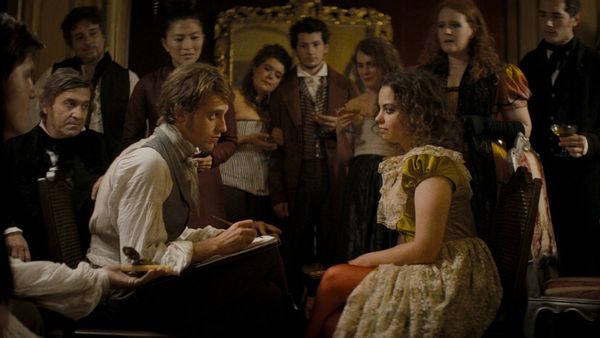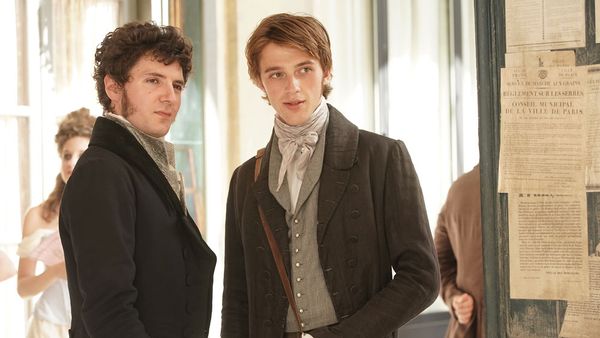
Ah, to be a critic! In this media-snarky world, it is reassuring that "Lost Illusions," the great 19th Century European realist novel by Honoré de Balzac, was exceedingly prescient to our current age of social media — and how reputations can be won and lost, or bought and sold.
Xavier Giannoli's sumptuous adaptation, which was nominated for 14 César Awards (French Oscars) and won seven, is, all about, "ink, paper, and the love of beauty." The film charts the rise and subsequent fall of Lucien (Benjamin Voisin), a 20-year-old poet from Angoulême. He writes poems for Louise de Bargeton (Cécile de France), whom he loves, but her husband's influence (read: threat) forces Lucien to leave for Paris. It is in the city, where he is out of his depths, that his life truly begins.
Giannoli effortlessly guides the viewer through Parisian society and its players as eloquently as the narrator recounts Lucien's story of ambition gone wrong. Lucien gets off on the wrong foot when makes a bad impression at the theater with Louise and her prominent relation, the Marquise d'Espard (Jeanne Baibar). He is also rude to Nathan d'Anastazio (filmmaker Xavier Dolan), a writer and dandy who soon becomes Lucien's frenemy.
RELATED: In the PBS doc "Storm Lake," a tiny Iowa paper fights for the future of high-quality local news
Lucien's initial failure in society prompts him to meet two other influential people of lower class: Etienne Lousteau (Vincent Lacoste) a newspaper writer who helps him get a job, and Coralie (Salomé Dewaels), a working-class actress who becomes Lucien's lover.

"Lost Illusions" shows how Lucien navigates this insular world with an arrogance and impudence. Voisin, who has the mother-of-pearl skin that Balzac writes about, is perfectly cast as the naïve young poet who generates pity when he is foppish and humiliated at the theater. And viewers will cringe whenever Lucien thinks he has the upper hand, but is really being played for a fool. Even if the undesirable outcomes of Lucien's escapades are telegraphed, Giannoli still generates emotion with every setback. Lucien deserves most of his comeuppances, but he remains sympathetic because Voisin captures his insouciance as a striver and social climber.
Want a daily wrap-up of all the news and commentary Salon has to offer? Subscribe to our morning newsletter, Crash Course.
A key episode that unfolds at the offices of Dauriat (Gérard Depardieu), a publisher, who asks Lousteau what he thought of Nathan's new book. Lousteau, who hasn't read it, does not let that stop him from offering an opinion. And when Lucien is asked for his review, his trolling Nathan is akin to a Twitter war, only the insults are spoken face to face. Huzzah! Lucien's career as a critic is born — and it is lucrative. His ego grows as exponentially as his wallet. (Alas, today, criticism does not pay as well, especially when social media makes everyone a critic.)
One of the film's best sequences shows how money drives everything. ("Avarice begins when poverty ends," writes Balzac, shrewdly, in his novel.) Giannoli deftly illustrates how writers/critics are the brokers between the artists and public, and everyone and everything has its price. The newspapermen are paid to review a book or a show, and men like Singali (Jean-François Stévenin), sells "boos" or applause at the theater to the highest bidder. The bribery and corruption extend to advertisers who sell the public what it wants (but doesn't need), and of course, politicians are guilty of this chicanery as well. There is even a discussion of "Fake News," and how it benefits from denial. Surely, a trumped-up rivalry between author and critic is good for sales?
"Lost Illusions" amplifies its messages about conscience and integrity as Lucien leverages his newly minted reputation to gain the thing that he most desires — to regain the title of his name. (He goes by Lucien de Rubempré, his mother's name; he is really Chardon, after his father). But will Lucien sell his soul to the highest bidder? He gains success writing satires and is asked by the Royalists (Lousteau's rivals) to pen smear campaigns against influential folks to sway public opinion. Likewise, when he is assigned a review of Nathan's new novel, Lucien feels compromised because it is an astonishing book and Lousteau wants a hatchet piece. What is a critic to do?
Lucien's professional mind may be clouded by doubt, but his ambivalence extends to his personal relationships as well. He uses his power to help Coralie secure a part in a revival of "Macbeth," but as they become destitute, her performance and the play must be a success. When Louise sends word through Nathan to Lucien that she wants to see him, he wonders if his former lover plans to rekindle their affair. In a terrific scene, Louise and Coralie meet without Lucien's knowledge; it reveals much about their characters.
"Lost Illusions" makes all this drama captivating for its entire 150 minutes, which speed by nimbly. Giannoli pauses briefly as Lucien's disillusionment takes over and he cannot tell his allies from his enemies, but viewers won't need a scorecard. The film is so impeccably made — the cinematography, costumes, and art direction are all fabulous — that only Lucien cannot see the "cold, inhumane smiles" of his detractors to know he has blundered in his efforts to get ahead.

If Lousteau were to encourage negativity towards this accomplished film, it would be easy to accuse Giannoli for capturing only the spirit, and not the letter, of the novel. A celebratory scene features Lucien being baptized and floating along in a rarified air of gold confetti like a rock star is the film's sole over-the-top moment. The filmmaker also downplays the romantic passions of the characters. The way Nathan eyes Lucien conveys a delicious, unspoken attraction that has more heat in it than Lucien's brief, sweaty trysts with either Louise or Coralie.
But these are minor flaws in a film that is otherwise exceptional. "Lost Illusions" ends with a closeup on Lucien's resigned face that reveals everything and perhaps nothing. It would be suitable for posting on Instagram — if Lucien were to still have any followers.
"Lost Illusions" which opens in theaters on June 10. Watch a trailer below, via YouTube.
More stories to check out:







